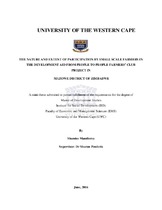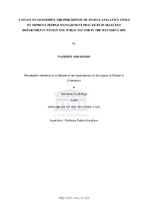The nature and extent of participation by small scale farmers in the Development Aid from People to People Farmers' Club project in Mazowe District of Zimbabwe
Abstract
The conventional top-down approach to development has been rendered unsustainable and is regarded as a poor strategy to achieving community empowerment and development. The past few decades have seen the promotion of bottom-up techniques whereby governments and developing agents collaborate with target beneficiaries and view them as equal partners in the development of their own communities. It is generally believed that the participation of farmers in agricultural projects improves the performance of the agricultural sector. However, despite the adoption of participatory models, agricultural societies have remained plagued by poverty. It is against this background that this research using the Mazowe District as a case study investigated the nature and extent of participation by small scale farmers in the Development Aid from People to People (DAPP) Farmers’ Club in order to document the extent to which farmers have been empowered. The study made use of both quantitative and qualitative methodologies to gather relevant data. Broadly the findings indicate that the participation of farmers in the DAPP Farmers' Club project was substantively high. The results also suggest that the project empowered farmers to farm more productively in the case study area. In light of the findings the study recommends that governments and NGOs should follow the values and principles of the people-centred development (PCD) theory when implementing agricultural projects as it has proven to be an empowering approach. This practice may transform societies as there is an opportunity to address societal needs at grassroots level. In view of this research it can be argued that capacitating farmers through training and improving their farming skills can improve their agricultural production.
Collections
Related items
Showing items related by title, author, creator and subject.
-
A study to determine the perception of people analytics tools to improve people management practices in selected departments within the public sector in the Western Cape
Abrahams, Narzeen (University of Western Cape, 2020)People analytics refer to people-related, data-driven, processes (e.g. trend analyses and data management) aimed at describing and evaluating the effectiveness and efficiency of people management practices and processes ... -
A critical comparison of the role of education In the struggle for political, power within christian national education' volkskole' (1900-1910) and' people' s/ Education for people's power (1985-1989)
Damonse, R (University of the Western Cape, 1993)This minithesis is concerned with the nature of resistance education in South Africa. During the 1985-1989 period in South Africa , the notion of People's Education for People's Power enjoyed prominence on the national ... -
Stigmatization of and discrimination against people who are HIV positive, or have AIDS – a female perspective in Zwartwater, Eastern Cape Province
Malgas, Khangela Frida (University of the Western Cape, 2011)The aim of this study is to investigate the perceived stigmatization of and discrimination against people who are HIV positive or people who are living with AIDS. One questionnaire was used to collect qualitative and ...




